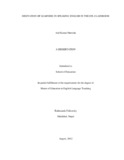
Please use this identifier to cite or link to this item:
https://hdl.handle.net/20.500.14301/215| Title: | HESITATION OF LEARNERS IN SPEAKING ENGLISH IN THE EFL CLASSROOM |
| Authors: | Shrestha, Anil Kumar |
| Citation: | Shrestha,A.K.(2012).Hesitation of learners in speaking English in the EFL classroom. |
| Issue Date: | Aug-2012 |
| School: | SOED |
| Department: | DOLE |
| Level: | Masters |
| Program: | Master of Education in ELT (2 years) |
| Abstract: | Speaking is a primary medium of communication. Speaking ability lies at the heart of any ELT program that aims at making students able to communicate in English accurately, fluently and appropriately. Second language learners seem to be primarily eager and interested in learning to speak as if “speaking” skill enables the learners to generate and articulate ideas, arouse feelings, give a chance to be heard, convince and persuade others. This study was carried out with the primary purpose of exploring the factors that hinder especially Grade 10 students of Lalitpur district to speaking in English in EFL classroom. The main focus of this study is to find out causes of hesitation, along with their implications to enhance communicative competence. I used qualitative approach in order to explore the ground reality of hesitation of the learners in speaking English’. I selected six different secondary level English teachers and students from Lalitpur district by using purposive sampling. Likewise, I used ethnography as the method to explore the natural and cultural setting of those schools engaging in their real world. I used multiple tools such as interview and observation to collect the data. The finding of this research study revealed that most of the students who study in government school hesitate in speaking because of lack of sufficient exposure, excessive use of mother tongue in the class, less emphasis on the importance of teaching speaking, less emphasis on pronunciation skill, lack of use of communicative activities and communicative approach of language teaching, lack of proper attention on the gravity of hesitation, lack of formative assessment for speaking test, teacher centered approach, exam oriented teaching learning process, and the negligence of both subject teachers and administration of government aided schools. Based on the findings and the conclusions of my study, I have presented the implications that the hesitation of the students in speaking English can be reduced if the students are provided with separate period for speaking where they can share their opinion, feeling and emotion in a natural setting. I have discussed that the teachers should create English world inside the classroom using recorded taps, audio cassette, audio visual material and teacher talk to provide sufficient exposure to the students. I have also suggested that they should use communicative activities such as group-work, pair-work, simulation, drama, dialogue, role-play, drilling to make the students participate actively forgetting their stress and anxiety. Likewise, I have recommended them to avoid GT method, use supplementary material besides text book, use student centered approach, keep balance between TTT and STT, use formative assessment to provide feedback and to reinforce the students constantly. |
| URI: | https://hdl.handle.net/20.500.14301/215 |
| Appears in Collections: | Dissertation |
Files in This Item:
| File | Description | Size | Format | |
|---|---|---|---|---|
| hESITATION OF LEARNERS IN SPEAKING eNGLISH IN THE EFL CLASSROOM3333.pdf | 1.42 MB | Adobe PDF |  View/Open |
Items in DSpace are protected by copyright, with all rights reserved, unless otherwise indicated.